In the global development of resource recycling and environmental protection, can shredders (also known as metal can crushers or can crushing systems) are core equipment for the refined processing of metal solid waste. Their efficient ability to crush diverse materials has made them a crucial link in the scrap metal recycling industry. This article will provide an in-depth analysis of this equipment from various perspectives, including its principles, core technologies, application scenarios, and associated equipment (aluminum can shredders), to assist industry practitioners in precise selection and application.
1. Why Does Your Metal Can Recycling Production Line Need a Professional Shredder?
In the recycling process of waste metals (especially cans and easy-open cans), "incomplete shredding → high transportation costs + low smelting efficiency" is a common pain point. Can shredders, through dual-shaft shearing technology, can directly convert metal cans from "bulky waste" into "granules for efficient recycling", which is also a key reason why single devices like aluminum can crushers cannot cover the processing of all types of metal cans.
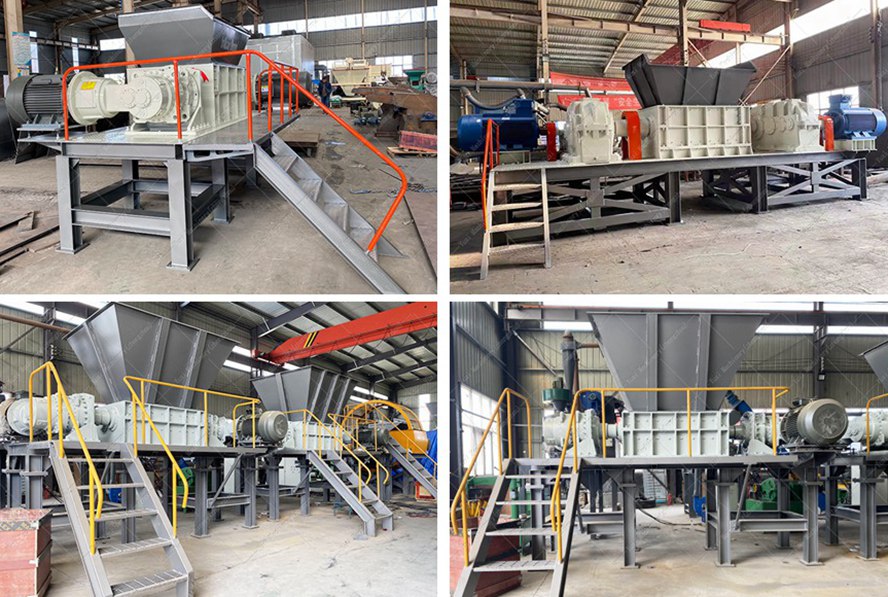
2. Core Technologies of Can Shredders: From Principles to Structures, Solving the Problem of "Choosing the Wrong Equipment"
(1) Working Principle: The Professional Logic of Dual-Shaft Shearing
Two NEMA Premium high-efficiency motors (with power ranging from 30HP to 100HP, suitable for European and American industrial electricity standards) drive parallel main shafts through hard-toothed surface reducers. The moving knives on the main shafts and the fixed knives in the shredding chamber form "meshing shearing" — this design can handle both the "toughness" of aluminum cans and the "rigidity" of iron cans, while ordinary aluminum can crushers can only handle the impact shredding of aluminum materials.
(2) Structural Details: Professional Designs for "Durability + Easy Maintenance"
• Shredding Chamber: Uses ASTM A128 Type B wear-resistant manganese steel lining plates. The surface hardness reaches HV500+ under impact load, perfectly resisting the high-frequency impact of metal cans (this is the core guarantee for not replacing the lining plates after more than 10,000 hours of operation);
• Knife System: Moving knives are made of AISI D2 alloy tool steel (hardness HRC58-62 after vacuum quenching), and fixed knives adopt the process of "hard alloy inlay + wear-resistant layer surfacing". After wear, they can be refurbished by plasma surfacing (with a reuse rate of 80%, greatly reducing consumable costs);
• Sealing and Transmission: The main shaft bearings are equipped with six-fold sealing units (including skeleton oil seals + labyrinth seals, etc.), which are waterproof and dustproof, and can operate stably even in humid/dusty recycling sites; the main shaft is a forging of SAE 4340 alloy steel, with a tensile strength of ≥1080MPa, preventing deformation under heavy loads.
3. Technical Advantages: Comparing with Aluminum Can Crushers, the "Irreplaceability" of Can Shredders
Many practitioners are torn between "choosing a shredder or an aluminum can crusher", and the core differences lie in these three points:
1. Material Compatibility: Shredders can handle aluminum cans + iron cans + mixed metal cans (such as food iron cans), while aluminum can crushers only target aluminum materials; moreover, the knife gap of shredders is adjustable (2-50mm), which can meet the needs of "coarse shredding for volume reduction" and "fine shredding for furnace feeding" at the same time;
2. Durability Design: For thick-walled materials such as iron cans, the thickened knife teeth (≥30mm) and high-hardness fixed knives (AISI D2 material) of shredders cannot be replaced by the lightweight knives of aluminum can crushers;
3. Scene Flexibility: It supports vehicle-mounted mobile design (with traction devices + tires), and the "arrive-and-shred" needs of small recycling sites can also be compatible with the mobile operation logic of aluminum can crushers.
4. Application Scenarios: From "Solid Waste Treatment" to "Resource Monetization", Solving the Problem of "Not Knowing What It Can Be Used For"
(1) Urban Solid Waste Sorting Stations
Separate and shred metal cans and easy-open cans mixed in domestic waste, which not only reduces the cost of landfilling/incineration but also completes the "volume reduction pretreatment" of materials such as aluminum cans in advance (replacing the front-end process of aluminum can crushers).
(2) Industrial Waste Recycling Plants
Aluminum engine casings from automobile dismantling and aluminum inner cylinders from household appliance dismantling, after being shredded into granules ≤50mm by shredders, the metal sorting efficiency is increased by 40%; for professional aluminum beverage can recycling plants, shredders can be used as a "pretreatment unit" to crush aluminum cans in batches and directly connect to the smelting production line.
(3) Regenerated Metal Smelting End
Shredded iron/aluminum granules are directly fed into the smelting furnace, reducing the smelting time by 20%; for the core output of aluminum can crushers (aluminum granules), the shredding precision (≤30mm) of shredders fully meets the feeding requirements of aluminum melting furnaces.
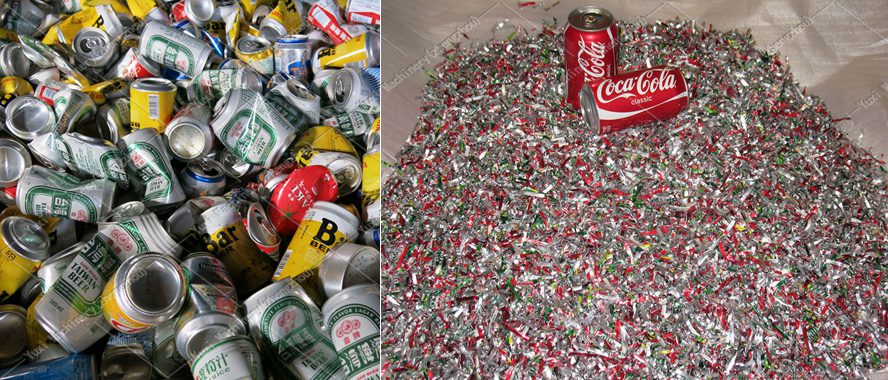
5. Selection & Procurement: Accurately Matching Production Line Requirements, Solving the Problem of "Fear of Buying the Wrong Equipment"
(1) Core Parameter Comparison
• Processing Capacity: Determined by the scale of the production line (conventional models: 3-30t/h), and must match the conveying capacity of the front-end conveyor; if mainly processing aluminum cans, you can refer to the typical processing capacity of aluminum can crushers (5-15t/h) for selection.
• Shredding Granularity: Clarify the final required granule size (adjustable from 10-80mm); if connecting to an aluminum melting furnace, choose a knife gap configuration of ≤30mm.
• Power Configuration: Choose a 30HP motor for thin aluminum cans, and upgrade to 75HP or more for thick-walled iron cans; if you need to be compatible with the aluminum can crushing function, add a special toothed knife set for aluminum materials.
• Special Requirements: Explosion-proof (complying with NFPA 70 standards), anti-corrosion (to deal with cans with acid-base residues), etc., must be clarified before procurement.
6. Frequently Asked Questions Q&A (Directly Solving "Stuck" Questions in Production)
1. Can Shredders and Aluminum Can Crushers Replace Each Other?
Answer: They cannot be completely replaced. Shredders are for "multi-material shearing shredding", while aluminum can crushers are for "single aluminum material impact shredding"; however, shredders can cover the front-end pretreatment process of aluminum can crushers, and when processing thick-walled materials such as iron cans, their efficiency and durability are far superior to those of aluminum can crushers.
2. Do Equipment Need Special Modifications When Processing Waste Metal Cans?
Answer: Yes. You need to use ≥30mm thickened knife teeth + AISI D2 high-hardness fixed knives, add ceramic wear-resistant lining plates inside the shredding chamber, and increase the motor power by 15% to deal with the high toughness of iron cans.
3. How to Calculate the Investment Payback Period?
Answer: Taking a production line with 10t/h and 80% metal recovery rate as an example, with an annual processing of 10,000 tons of materials such as aluminum cans and a raw material price difference of 1500 USD/ton, the payback period is usually 1.2-1.8 years after deducting equipment costs, consumables, and electricity costs.
4. What Is the Most Error-Prone Detail During Installation?
Answer: The foundation bearing capacity must be ≥15t/m² (to prevent vibration and displacement during operation); the coaxiality error between the motor and the reducer must be ≤0.05mm; for thin materials such as aluminum cans, the gap between the shredding chamber and the knives should be adjusted to 1-3mm.
If your production line is troubled by problems such as "incomplete metal can shredding, equipment vulnerability, and poor material compatibility", or you need to customize a can shredder solution that meets European and American standards, you can directly contact our technical team — we provide full-process support from production line planning to after-sales maintenance to help you turn "waste metal" into "high-value raw materials".
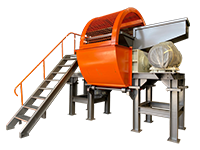 Shredding Machine
Shredding Machine
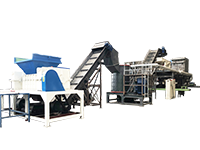 Waste Recycling Line
Waste Recycling Line
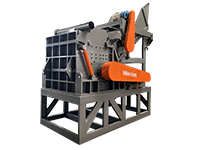 Optional Equipment
Optional Equipment


